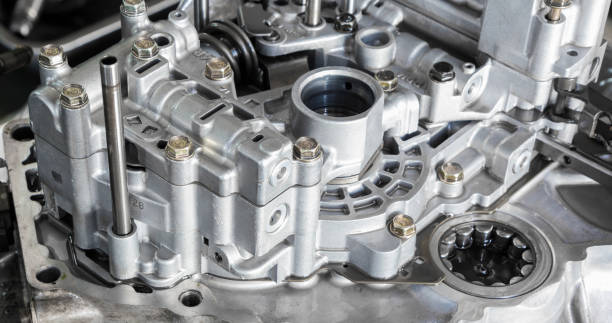The 15-Second Trick For Alcast Company
The 15-Second Trick For Alcast Company
Blog Article
What Does Alcast Company Do?
Table of ContentsNot known Details About Alcast Company Fascination About Alcast CompanyAlcast Company Can Be Fun For AnyoneThe Single Strategy To Use For Alcast CompanyThe 15-Second Trick For Alcast CompanyThe Main Principles Of Alcast Company
Chemical Comparison of Cast Light weight aluminum Alloys Silicon promotes castability by decreasing the alloy's melting temperature level and improving fluidity during casting. In addition, silicon adds to the alloy's stamina and put on resistance, making it important in applications where toughness is vital, such as automobile components and engine components.It likewise enhances the machinability of the alloy, making it easier to refine right into finished products. By doing this, iron adds to the overall workability of aluminum alloys. Copper raises electrical conductivity, making it advantageous in electric applications. It also boosts rust resistance and contributes to the alloy's total strength.
Manganese contributes to the toughness of light weight aluminum alloys and boosts workability (Aluminum Casting). It is generally used in wrought aluminum products like sheets, extrusions, and accounts. The visibility of manganese help in the alloy's formability and resistance to fracturing throughout fabrication procedures. Magnesium is a light-weight aspect that offers strength and influence resistance to aluminum alloys.
See This Report about Alcast Company
It enables the manufacturing of lightweight parts with superb mechanical residential properties. Zinc enhances the castability of light weight aluminum alloys and aids manage the solidification process throughout spreading. It improves the alloy's strength and firmness. It is often found in applications where intricate shapes and great information are required, such as attractive spreadings and certain automotive parts.

The key thermal conductivity, tensile toughness, yield toughness, and prolongation vary. Amongst the above alloys, A356 has the greatest thermal conductivity, and A380 and ADC12 have the least expensive.
4 Easy Facts About Alcast Company Shown

In accuracy spreading, 6063 is well-suited for applications where detailed geometries and premium surface finishes are extremely important. Examples include telecommunication units, where the alloy's exceptional formability enables sleek and visually pleasing layouts while keeping structural stability. In a similar way, in the Lighting Solutions market, precision-cast 6063 parts create stylish and effective lights fixtures that need complex forms and good thermal performance.
It brings about a better surface finish and better corrosion resistance in A360. The A360 displays exceptional prolongation, making it excellent for facility and thin-walled parts. In accuracy spreading applications, A360 is fit for sectors such as Customer Electronic Devices, Telecommunication, and Power Tools. Its improved fluidity permits intricate, high-precision components like smartphone casings and communication tool real estates.
All about Alcast Company
Its one-of-a-kind properties make A360 a valuable choice for precision casting in these sectors, boosting product resilience and quality. Aluminum alloy 380, or A380, is a commonly utilized spreading alloy with numerous unique qualities. It supplies exceptional castability, making it a suitable choice for precision spreading. A380 exhibits great fluidness when molten, making certain detailed and detailed mold and mildews are properly duplicated.
In accuracy spreading, aluminum 413 radiates in the Consumer Electronics and Power Tools sectors. This alloy's remarkable deterioration resistance makes it an exceptional choice for outside applications, making certain long-lasting, sturdy items in the stated markets.
Getting The Alcast Company To Work
When you have actually chosen that the light weight aluminum die casting procedure appropriates for your task, an important following action is picking one of the most suitable alloy. The aluminum alloy you choose will considerably impact both the spreading process and the residential properties of the final product. Due to the fact that of this, you have to make your choice very carefully and take an enlightened approach.
Establishing the most suitable light weight aluminum alloy for your application will certainly mean weighing a large variety of characteristics. These relative alloy qualities comply with the North American Pass Away Casting Association's guidelines, and we go to the website have actually split them right into two classifications. The initial group addresses alloy qualities that impact the manufacturing procedure. The second covers features influencing the homes of the end product.
The Only Guide to Alcast Company
The alloy you choose for die spreading directly influences a number of facets of the casting procedure, like exactly how simple the alloy is to collaborate with and if it is vulnerable to casting problems. Warm cracking, also called solidification breaking, is a regular die casting issue for aluminum alloys that can result in interior or surface-level rips or splits.
Certain aluminum alloys are more prone to warm splitting than others, and your option ought to consider this. An additional common problem located in the die casting of aluminum is pass away soldering, which is when the actors sticks to the die wall surfaces and makes ejection hard. It can damage both the cast and the die, so you need to search for alloys with high anti-soldering residential properties.
Corrosion resistance, which is already a significant feature of aluminum, can vary considerably from alloy to alloy and is a necessary particular to take into consideration depending on the environmental conditions your product will be exposed to (Casting Foundry). Wear resistance is another residential property generally looked for in light weight aluminum items and can differentiate some alloys
Report this page